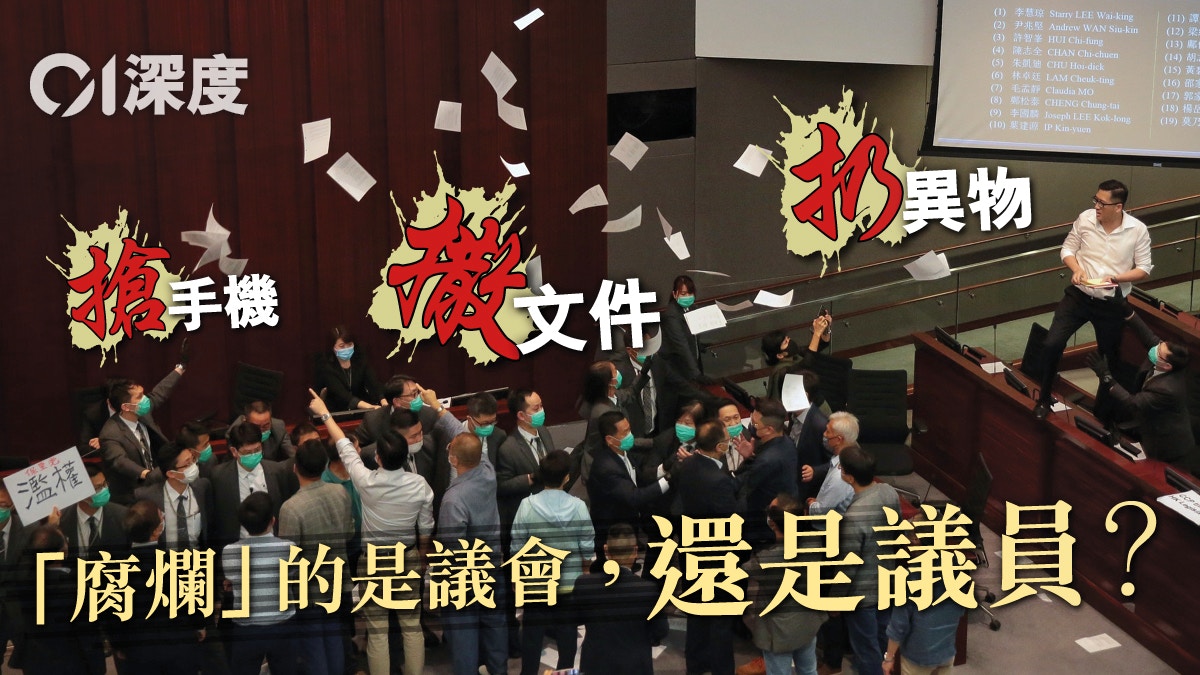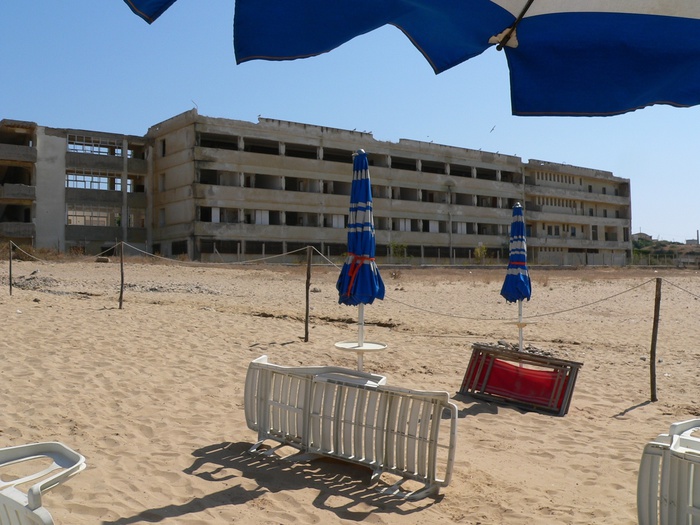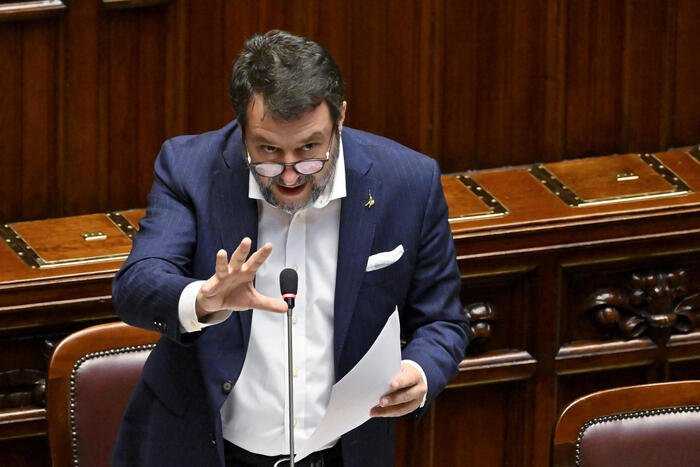weekly
Author: Hao Ziyu
2020-06-02 19:32
Date of last update: 2020-06-02 19:34During the Second Reading debate on the National Anthem Law Bill last Thursday (May 28), the scene was once chaotic due to the pan-popular efforts to "fight". Among them, Democrat Xu Zhifeng went straight to the rostrum to protest and to the rostrum Dumping rotten plants in the direction, and a strong odor came out that caused the meeting to halt-so to speak, coincidentally, there was a "parliamentary chaos" every ten days last month. On May 8th, the internal committee of the Legislative Council "troubled twins". Before the last chairman, Li Huiqiong, presided over the special meeting, the Panmin had broke out with the establishment of physical conflict; when the election of the chairman of the internal meeting was chaired by Chen Jianbo on May 18th, the two camps again "Play a big deal." For Hong Kong people, such a scene in the Legislative Council is not uncommon. Since Huang Yumin's plantain-throwing incident started in 2008, various forms of "statement" have emerged in an endless stream, and even began to vigorously, turning serious meetings into farce. Is this the high-quality parliamentary culture we want?
On May 28, during the Second Reading debate of the National Anthem Law Bill in the Legislative Council, Democrat Xu Zhifeng went straight to the rostrum to protest and dumped rotten plants in the direction of the rostrum. A strong odor was heard and the meeting was suspended. (Profile picture)
"Parliamentary violence" becomes "political show"?
"Parliamentary violence" generally refers to the physical or verbal violence that members of the parliament appear in the parliament. In recent years, it has also been used by the pan-democracy to describe procedural justice. Although we are used to it, it is not surprising that more than 10 years ago, the Hong Kong Legislative Council was not the case, and the Hong Kong people even sneered at the "parliamentary chaos" in Taiwan. Since the DPP legislator Zhu Gaozheng jumped onto the podium in 1988 and beat the Kuomintang legislator Liu Kuocai, the opposition DPP and the Kuomintang in power often fought in parliament, and the green-blue melee has become a symbol of the Legislative Yuan-throwing water polo, Various forms of physical conflicts, such as tossing flour, slapping and smashing chairs, are endless. Local public opinion has criticized legislators from time to time to seek exposure and votes, blindly shouting slogans to show, making expressions ideological and unable to discuss things; Western media also attracted them, "Funny" sponsored by the American Incredible Research Annual Report, a well-known scientific humor magazine in the United States The "Nobel Prize" even awarded them the "Peace Prize", and satirized "Legislative fights are more politically effective than wars."
In those days, Taiwan’s parliamentary melee was often a joke for Hong Kong people after dinner. However, the parliament’s “strange tricks” did attract the attention of voters, and legislators were more happy. Today’s Hong Kong Legislative Council seems to be exactly the same.
Like Hong Kong, Taiwan society most often mentions the old parliamentary political country, the United Kingdom, when reviewing parliamentary chaos. The British Parliament is divided into the House of Lords and the House of Commons, and members of the two parties sit in line and argue fiercely. The floor of the first row of seats of the House of Commons is further painted with red lines to separate the two sides and cannot be crossed. This formal red line has gradually formed an atmosphere of "gentlemen do not speak" in the parliamentary culture. In the face of fierce battle between the two sides, the speaker will also shout "order" to remind, but it is only limited to the competition of views, which is more like a debate conference than a battlefield.
The British Parliament is divided into the House of Lords and the House of Commons, and members of the two parties sit in line and argue fiercely. The floor of the first row of seats of the House of Commons is further painted with red lines to separate the two sides and cannot be crossed. (Associated Press)
Is it possible to change "body struggle" into "wisdom struggle"?
In 2008, Huang Yumin, a member of the Legislative Council of the Social and People’s Company, threw three bananas at the chairman’s table where Zeng Yinquan stood in order to express his dissatisfaction with the review plan for the old-age allowance commonly known as the “fruit grant” during the Chief Executive’s Tsang Yinquan’s reading of the “Government Report” This move was accused of pioneering Hong Kong's "parliamentary resistance" and gradually "Taiwanizing" the Hong Kong Legislative Council. Some people think that this kind of tough physical resistance can help break the situation that the democrats have long been accused of "invalidation of resistance", but others have criticized that the parliament is gradually deteriorating.
The former chairman of the Legislative Council, Jasper Tsang, discussed the parliamentary culture through the Hong Kong radio show "Hong Kong Family Letters" in 2012. He admitted that compared with the Legislative Council 30 years ago, there was indeed a significant change in the parliamentary culture in 2012, because during the Hong Kong-British era, most of the members were appointed by the Hong Kong Governor, and they naturally tended to cooperate with the government and be polite with each other, but in the late British colonial period. In the beginning, elected members entered the parliament. They took the responsibility of monitoring the government as their own responsibility and consciously made sharp criticisms on behalf of the public. He also believes that the lip service in the parliament cannot be regarded as the entire work of the parliamentarians, because behind the lens they actually cooperate to complete a lot of work; in addition, directly elected parliamentarians must also contact the voters, handle complaints, and function groups Members must also respond to industry demands-so, according to what he said at the time, it would be unfair for them to focus only on the noisy work of the members under the lens and ignore their work.
During the "Twins" in the internal meeting, the Democratic Party Lin Zhuoting stood on the table and tore up the "Rules of Procedure" and shredded the paper into the air. (Profile picture)
However, over the past eight years, "rab" has become more frequent, "noisy" has become more common, and the forms of political expressions have become more and more tricky. The parliamentarians even arrogantly rationalized various unexpected behaviors. In addition to the above-mentioned plantain throwing incident, at that time, the community members, even Mr LEUNG Kwok-hung, also expressed their objections to the "Encouragement of Employment and Transportation Allowance Scheme" (referred to as "Jiaojin"), throwing the words "Jiaojin" in Cantonese to the then Secretary for Labour and Welfare Zhang Jianzong The plastic bottle also twisted it, implying that the plan was twisted. As for the "Twin Brothers" in the earlier meeting, the Democratic Party Lin Zhuoting stood on the table and tore the "Rules of Procedure" and shredded the paper in the air, in order to express the authority of the chairman given by Chairman Liang Junyan's "Rules of Procedure" Dissatisfaction with the cloth, shouted "Don't forget the rules of procedure." The reason why Xu Zhifeng brought rotten plants into the chamber and kicked the rostrum last week argued that it implied that one country, two systems, the rule of law, system and civilization had rotted, and that Liang Junyan should taste the rot.
Hong Kong’s previous parliamentary culture was mostly about expressing political intentions with objects and behaviors, and also used to prevent government bills from passing. However, after gradually becoming a physical conflict, it is hard to convince the world that “this is not parliamentary violence”. Even though the parliamentarians have done a lot of practical work behind the scenes that are invisible to everyone, the shoving and slaps in the lens, being injured and sent to the hospital, being forcibly taken out of the venue, only showing the "political performance art" without talking about the content of the bill, etc. Waiting is also a fact. Although Article 3 of the Legislative Council (Powers and Privileges) Ordinance (Chapter 382 of the Laws of Hong Kong) stipulates that Members shall enjoy criminal and civil immunity in speech and debate in the proceedings of the Legislative Council, I believe the intention is only to guarantee the freedom of speech and debate of Members’ speeches, It's not that I want to see the meeting become farce. As for how to form a high-quality parliamentary culture, it is not too late to wait until we see the Legislative Council that speaks with wisdom and people-centered thinking, rather than the "battlefield" where the "war" is started before the topic is said.
More "Hong Kong 01" in-depth report articles:
Hong Kong version of the National Security Law|Liang Meifen urged to complete 23 articles as soon as possible
[Hong Kong version of National Security Law. Depth] How does Macau complete Article 23 of the Basic Law?
[Second Reading of National Anthem Law. Depth] An article to see the true and false issues of legislative disputes-prejudices or excuses?
History Section. Depth|Thinking about the national consciousness from the dispute of test questions-what kind of Hong Kong people did the colony cultivate?
Hong Kong version of the National Security Law|Why did “Terrorist Prevention and Control” not covered by Article 23 of the Basic Law appear?
Hong Kong version of National Security Law|From "Self-Legislation" to "Central Legislation"
Hong Kong version of the National Security Law. Depth|Dialogue with Jasper Cheng——Unexpected reason for the “surprise” by the central government
[Hong Kong version of National Security Law. Depth] How to enforce the law after legislation?
[DSE History Department. Depth] Behind the controversy of test questions-conflict between teaching and goals
【Depth】Liang Junyan's proselytism will be full of ups and downs-this is how the Parliament shut down for half a year
[Within the storm. Depth】Why did Liang Junyan turn a blind eye on the majority of Panmin Rab?
[Article 22 of the Basic Law. Depth] Xinhua News Agency to the Central Liaison Office has never been a general department
01 depth
In-depth report on the troubles in the Legislative Council of the Legislative Council Xu Zhifeng Pan Democratic Constructionist Taiwan Liang Junyan








